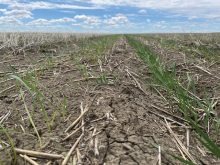Agriculture Minister Gerry Ritz’s decision to keep CWB’s 2012-13 annual report from the public is being criticized by opposition members of Parliament.
Farmers and taxpayers have a right to see CWB’s financial statements Liberal MP Ralph Goodale and NDP Agriculture Critic Malcolm Allen said in separate interviews last week.
“It should be remembered whatever revenue and assets this new creature (CWB) has inherited, it has inherited all of that value from farmers,” Goodale, a former Canadian Wheat Board minister, said in an interview Sept. 25. “This is farmers’ money, farmers’ assets, not to be played with arbitrarily and secretly by the government.”
Read Also

June’s fast-moving grain markets
Summing up the grain markets: June 2025 was an interesting month for canola prices and geopolitics stole the spotlight from grain market specifics
Allen said Ritz’s move is distressing, but not surprising.
“Once again this government lacks transparency and accountability to farmers and the Canadian public around an asset they still actually own.”
Amended act
CWB is the government-owned grain company created Aug. 1, 2012 when Ottawa ended the Canadian Wheat Board’s sales monopoly on western wheat and barley destined for domestic human consumption or export.
Under the amended Canadian Wheat Board Act, CWB is obliged to present Canada’s agriculture minister with an annual report, including its audited financial statements, and the minister must table it in Parliament. The same applied to the old Canadian Wheat Board. However, Section 21(1)3 of the act allows the minister to withhold information he deems to be commercially sensitive.
One of Ritz’s officials said the minister tabled CWB’s annual report in July, but only the notes to CWB’s financial statement are available. The notes refer to accounting practices and potential liabilities, but provide no information about the company’s finances.
According to Allen the notes weren’t tabled in Parliament, but with Parliament’s Journals Branch.
Neither Goodale nor Allen believes CWB’s entire annual report to be too commercially sensitive to release. The annual reports released to Parliament and the public by the old wheat board reported included a complete accounting of its revenues and expenses, broken out by each pool, as well as volumes of grain sold and to which markets.
The salaries of the highest-paid employees were also included as well as the per diems and expenses of both elected and appointed directors.
Challenge
Goodale said Ritz’s decision to keep the report essentially secret should be challenged in court and reviewed by Canada’s auditor general.
“This is a healthy dose of hypocrisy from this government,” Goodale said. “It would rail at the so-called secrecy of the former Canadian Wheat Board… but this new entity is a complete black box. It’s just a joke.”
Goodale said he suspects CWB didn’t do well in its first year in an open market. If it had, Ritz would be bragging about it, Goodale said.
In April, CWB president and CEO Ian White said CWB intends to provide a privatization plan to Ritz before the 2016 deadline set out in legislation, which requires CWB to be privatized or wound down by 2017.
“We expect our privatization to happen sooner than that,” White said. “We are expecting to be able to get a plan to government this year and then the process will take place after that.”
Last month, Farmers of North America (FNA) proposed creating a farmer-owned company that would take majority ownership of CWB. FNA also proposed the new company distribute nitrogen manufactured by the farmer-controlled nitrogen plant FNA is promoting.
When Liberal MP Wayne Easter asked about CWB’s annual report in the House of Commons Sept. 26 Pierre Lemieux, parliamentary secretary to the minister of agriculture, replied: Mr. Speaker, much to the joy of our western Canadian grain farmers, our government delivered on its promise to free them of an obligatory marketing board. We were elected on a platform to deliver marketing freedom to farmers and we followed through on that commitment.
However, as the Canadian Wheat Board now competes in the open market, it has a right to protect commercially sensitive information.




















